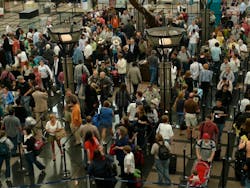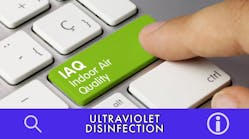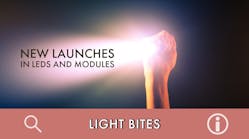Danish, Dutch UV-C LED combo aims at pathogens on airport baggage trays
With humankind upping its attentiveness to hygiene amid the pandemic, LED companies are turning more effort to developing ultraviolet (UV) germicidal products — even if they don't necessarily zap the virus behind COVID-19. One example out of Denmark may well make airport security check-in points more hygienic, although the coronavirus jury is still out.
LED iBond, based near Copenhagen, recently announced that its affiliate LED Aviation is supplying Dutch baggage and package handling automation company Vanderlande with a UV-C-emitting LED disinfection system that Vanderlande will build into luggage tray conveyor systems for airport check-in points. LED iBond owns 41% of LED Aviation and is making the subsystem for Aviation, using iBond technology.
The idea is to quickly wipe out pathogens from the trays constantly pawed and grabbed by hordes of passengers and employees during normal traffic times. While the announcement did not claim that LED Aviation's UV-C system would kill the SARS-CoV-2 virus that causes COVID-19 — it made no mention at all of the virus, the disease or the pandemic — one might imply that LED Aviation, iBond, and Vanderlande hope that the system does indeed snuff out SARS-CoV-2.
UV-C — very short wavelength ultraviolet — from conventional mercury vapor lamps and from LEDs in the right doses has been proven to kill the coronavirus. Manufacturers including Signify, Osram, GE Current, and others are manufacturing UV-C products specifically targeted at the coronavirus in different environments, with Signify and Osram cranking up production of mercury vapor lamps, and GE Current pursuing the LED route.
In broad, general terms, LED iBond did not rule out the possibility that the system would deactivate the novel coronavirus. It said that the LED Aviation UV-C system it is making for Vanderlande is intended for “microbial disinfection.” Viruses and bacteria are both microbes.
On a separate page webpage not directly linked to the announcement of the new airport system, LED iBond notes that its UV-C technology in general “can inactivate a wide range of pathogens, including — but not limited to — MRSA, C. difficile, E. coli, and pseudomonas.” Those microbes are all bacteria, not viruses. From a coronavirus perspective, the key phrase would be “not limited to.” On the same page, LED iBond notes that “the Covid-19 outbreak has initiated a global search for solutions that can prevent the spread of the virus,” and states that “one of our focus points at LED iBond is the development of solutions to this area.” It stops short of saying the baggage tray system fits the bill.
LEDs Magazine asked LED Aviation whether its LED UV-C system will deactivate the coronavirus. Co-founder and CEO Ole Brinks Andersen pointed to a University of Miyazaki report in the journal Emerging Microbes & Infections. The report states that in an vitro study, irradiation with LED UV-C at between 275 and 285 nm “rapidly inactivates SARS-CoV-2 obtained from a COVID-19 patient.”
The study would seem to hold promise for the LED Aviation system as a corona zapper.
Veghel, Holland-based Vanderlande also stopped short of saying that its UV-C disinfection system kills the coronavirus. “Vanderlande introduces its new UV-C Tray Disinfection solution, designed to help airports make security checkpoints safer for both passengers and employees,” the company stated. “Using short wavelength ultraviolet light, the solution is capable of killing and deactivating 99.9% of bacteria and viruses on trays between each use.”
Again, without mentioning COVID-19 or the coronavirus, it further notes that, “It is well known that the trays used at security checkpoints pose a concern as each bin can be touched by hundreds of passengers every day. Without an automated sanitizing solution, this would result in a significant increase in the need for manual cleaning of trays as well as a decrease in throughput at the checkpoint. Designed to be easily integrated to new and existing automated screening lanes, Vanderlande’s UV-C unit automatically sanitizes trays between each use as they travel from the end of the lane back to the divesting area.”
Related article: Robotic UV-C systems will disinfect JetBlue passenger jets
LEDs asked Vanderlande if the system would be effective against the coronavirus. A spokesperson responded that “we cannot share any more information about this right now.”
Vanderlande noted in a separate announcement that wiping out the coronavirus from airport baggage environments “cannot be solely dependent on one specific technology.” It said that it has analyzed “the processes surrounding the passenger and baggage journeys through an airport,” and that it plans to release specifications this month on how to disinfect hold baggage.
Neither LED iBond/Aviation nor Vanderlande would say whether any airports have ordered the UV-C systems. LED iBond said that it will make 50 UV-C disinfection systems for LED Aviation to supply Vanderlande, to be provided starting this quarter through the first quarter of 2021.
Related article: United utilizes handheld germicidal UV-C products to disinfect flight decks
LED iBond has a history in making thin LED light sources using what it calls a “sandwich” technology that eliminates printed circuit boards, heat sinks and drivers and instead places an LED between two aluminum composite panels. The thinness provides an advantage in tight spaces such as baggage tray tunnels, the company notes. Vanderlande that the UV-C emitters are shielded, preventing exposure to passengers and airport workers — a necessary measure given that UV-C can be damaging to skin and eyes.
LED iBond is also active in IoT lighting, offering systems that carry data and electricity over the same cable and that links lighting systems to sensors to help run “smart buildings.”
It is branching into new markets such as airport security by forming new ventures with other investors. It owns 41% of LED Aviation. The other investors are BA Holding and HoMiTo, a private Danish investing firm.
--
NEXT, LEDs Magazine will take a look at a new LED-based in-car air purifier that should make group travel in cars healthier, although not necessarily COVID secure.
MARK HALPER is a contributing editor for LEDs Magazine, and an energy, technology, and business journalist ([email protected]).
For up-to-the-minute LED and SSL updates, why not follow us on Twitter? You’ll find curated content and commentary, as well as information on industry events, webcasts, and surveys on our LinkedIn Company Page and our Facebook page.

Mark Halper | Contributing Editor, LEDs Magazine, and Business/Energy/Technology Journalist
Mark Halper is a freelance business, technology, and science journalist who covers everything from media moguls to subatomic particles. Halper has written from locations around the world for TIME Magazine, Fortune, Forbes, the New York Times, the Financial Times, the Guardian, CBS, Wired, and many others. A US citizen living in Britain, he cut his journalism teeth cutting and pasting copy for an English-language daily newspaper in Mexico City. Halper has a BA in history from Cornell University.



![The DesignLights Consortium continues to make progress in shifting outdoor lighting products and implementation practices toward a more restrained and thoughtful strategy. [Image does not represent a DLC qualified fixture.] The DesignLights Consortium continues to make progress in shifting outdoor lighting products and implementation practices toward a more restrained and thoughtful strategy. [Image does not represent a DLC qualified fixture.]](https://img.ledsmagazine.com/files/base/ebm/leds/image/2024/08/66be810888ae93f656446f61-dreamstime_m_265700653.png?auto=format,compress&fit=&q=45&h=139&height=139&w=250&width=250)

